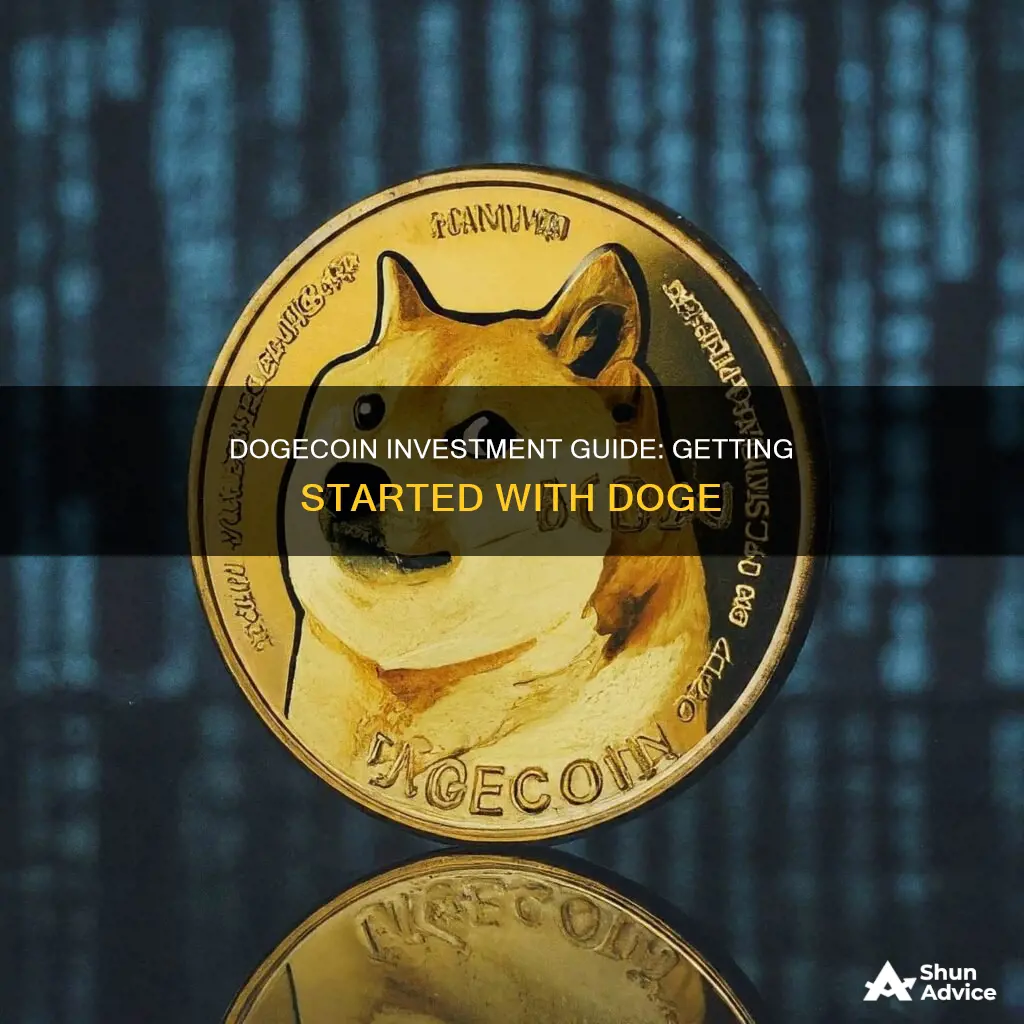
Dogecoin is a cryptocurrency that was created as a joke based on a popular meme of a Shiba Inu dog. Despite its lighthearted origins, it has gained a cult status among investors, with some early investors seeing a 7,000% return on their investment.
Dogecoin can be purchased on a cryptocurrency exchange, such as Coinbase, Binance, or Kraken. These platforms allow users to buy, sell, and trade multiple cryptocurrencies, including Dogecoin.
Before investing in Dogecoin, it is important to understand the risks involved. Dogecoin is highly volatile and unpredictable, and its value can fluctuate significantly based on social media movements and hype. It is recommended that investors allocate no more than 3% to 10% of their portfolio to risky assets like cryptocurrencies.
What You'll Learn

Choosing a crypto exchange
Supported Cryptocurrencies
Firstly, ensure that the exchange offers Dogecoin. While major crypto exchanges like Coinbase, Gemini, and Kraken offer Dogecoin, not all exchanges do. Check that the exchange provides access to a range of cryptocurrencies if you're interested in investing in other coins beyond Dogecoin.
Payment Methods
Consider the payment methods accepted by the exchange. Most exchanges support wire transfers, while some also allow purchases via credit or debit cards. Choose an exchange that aligns with your preferred payment method.
Fees
Crypto exchanges typically charge trading fees and withdrawal fees, but other transaction fees may apply. Compare the fee structures of different exchanges to find the most cost-effective option for your needs.
Security
Security is a critical factor when choosing a crypto exchange due to the prevalence of hacking and cyber theft. Look for exchanges with robust security protocols, such as two-factor authentication, encryption, and cold storage of assets.
Customer Service
If you're new to crypto investing, opt for an exchange with strong customer support. Check reviews and feedback from other users to gauge the responsiveness and effectiveness of the exchange's customer service.
Reputation and Regulatory Compliance
Research the exchange's reputation and regulatory compliance. Read customer reviews, news, and the exchange's history to assess its reliability and trustworthiness. Ensure the exchange complies with Know Your Customer (KYC) and Anti-Money Laundering (AML) regulations.
Advanced Trading Features
If you're an experienced trader, consider exchanges that offer advanced trading tools, margin trading, futures trading, and customisable charts. These features may be essential for more sophisticated investment strategies.
User Experience and Educational Resources
For beginners, a user-friendly interface and educational resources can be invaluable. Look for exchanges that provide tutorials, guides, and market insights to help you make informed investment decisions.
Remember to assess your investment goals, risk tolerance, and level of experience before choosing an exchange. Diversifying your investments across multiple exchanges can also reduce risk and provide access to a broader range of cryptocurrencies.
The Ultimate Guide to Buying Bitcoin for Investment
You may want to see also

Payment methods
There are several ways to pay when investing in Dogecoin. The first step is to open an account with a cryptocurrency exchange, such as Coinbase, Binance, Kraken, or Gemini. These platforms allow you to buy, sell, and exchange Dogecoin for other cryptocurrencies or fiat currencies.
Most exchanges will accept fiat currencies, such as the US dollar, for direct purchases of Dogecoin. To make a purchase, you will need to create an account and fund it from your bank account. Some exchanges may also accept wire transfers and PayPal transfers.
A few exchanges also allow you to use a credit card to buy Dogecoin, but this is generally not recommended due to the associated fees and higher APR. It is treated as a cash advance by credit card companies, resulting in additional charges.
If you already own cryptocurrency, you may be able to trade it for Dogecoin. However, not all cryptocurrencies can be exchanged for Dogecoin, and the availability of this option varies depending on the platform.
Once you have deposited money into your exchange or brokerage account, you can place an order for Dogecoin. Search for Dogecoin or enter its ticker symbol, DOGE, specify the amount you wish to spend or the number of Dogecoins you want to buy, and finalise the transaction.
Another way to pay for Dogecoin is through peer-to-peer (P2P) transactions, which involve transferring funds directly from one blockchain address to another without a third party. P2P trades are often facilitated by online platforms and forums that connect local users who wish to trade Dogecoins for products, services, or fiat currencies.
Additionally, some third-party platforms and crypto cards allow you to use Dogecoin for purchases, donations, and payments to merchants and service providers who may not directly accept cryptocurrencies.
Best Long-Term Crypto Investments: Picking the Winners
You may want to see also

Storage options
When you buy Dogecoin, it is usually kept in your exchange or brokerage crypto wallet by default. However, some investors prefer to withdraw their crypto from their exchange or brokerage and store it in another wallet.
There are two main types of crypto wallets: hot wallets and cold wallets. Hot wallets are digital and connected to the internet, while cold wallets are physical hardware that can be disconnected from the internet, making them less susceptible to hacking.
Hot wallets are typically free, but they are more exposed to hacking. Cold wallets, on the other hand, are generally more expensive and carry a greater risk of being unable to access your cryptocurrency if you lose or forget the password.
- Hot wallets:
- Binance: Binance's custodial software wallet supports a wide range of cryptocurrencies, including Dogecoin. It offers security features such as two-factor authentication and address whitelisting.
- Exodus: Exodus is a widely used software wallet that supports over 200 cryptocurrencies, including Dogecoin. It is non-custodial, giving users control of their private keys, and offers security features such as PIN protection, biometric login, and auto-lock.
- Coinbase: Coinbase Wallet is a custodial wallet that supports a range of well-known currencies, including Dogecoin. It offers security features such as a Vault, which allows you to store your funds separately and prevent immediate crypto withdrawals.
- Atomic Wallet: Atomic Wallet is a software wallet that allows users to store their keys in a non-custodial manner, giving them full control. It offers security features such as AES symmetric encryption and TLS protection.
- Cold wallets:
- Ledger (Nano X or S): Ledger is a popular hardware wallet provider, and its Nano X and Nano S models support the storage of Dogecoin private keys. Ledger wallets use a unique operating system, BOLOS, to isolate wallet apps and keep information secure. They also use a Secure Element (SE) chip to store seed phrases and private keys safely.
- Trezor (Model T or One): Trezor is another well-known hardware wallet provider with two models: the Model T and the Model One. Trezor wallets store your private keys offline and have features like two-factor authentication, PIN protection, and an ultrasound hardware seal.
- KeepKey: KeepKey is a hardware wallet developed by ShapeShift, a popular DeFi platform. It supports over 40 cryptocurrencies, including Dogecoin, and offers security features such as PIN protection and passphrases. KeepKey is a more affordable option, with prices starting at around $50.
IRA Bitcoin Investment: Is It Possible?
You may want to see also

Risks and volatility
Dogecoin is a risky, volatile investment. Its price is largely driven by social media movements and hype, and it is subject to extreme fluctuations. It is also sensitive to the market, so its price tends to move in concert with other cryptocurrencies.
Dogecoin has an unlimited supply, which means that for its price to increase or even remain steady, investors have to continually buy more coins. Otherwise, the supply of Dogecoin increases rapidly, and the value of all coins in circulation decreases. This is in stark contrast to cryptocurrencies like Bitcoin, which have caps on the number of coins issued, creating scarcity and helping to retain value.
Dogecoin's historical volatility can be measured by looking at its previous trends and behaviour, but this cannot conclusively determine its future direction. Its implied volatility, on the other hand, provides a positive outlook on future price fluctuations, assuming the crypto will return to its initially predicted market price.
The high volatility of Dogecoin can be advantageous for investors. When the price drops, investors can buy additional Dogecoin at a lower price, thus lowering their average cost per share and improving their portfolio's performance when the markets normalize. Similarly, when the price rises, investors can sell and invest the proceeds in other coins with better opportunities.
However, investing in highly volatile securities can also result in significant failure. Dogecoin is a risky investment, and investors can lose a large chunk of their portfolio. Its price is unpredictable, and it has a long way to go before becoming a staple payment token. The lack of widespread acceptance and limited adoption contribute to its risk.
Additionally, the lack of government regulation in the crypto space leads to more fraud and market manipulation. Dogecoin's value depends significantly on market sentiments, rumours, news, and even tweets.
To mitigate the risks of investing in Dogecoin, investors can practice risk management strategies such as dollar-cost averaging, HODLing, and leveraging short-term price movements. It is also recommended that investors should not allocate more than 3% to 10% of their portfolio to cryptocurrencies.
The Best Crypto Coin to Invest in Now
You may want to see also

Dogecoin's history
Dogecoin was created in 2013 by software engineers Billy Markus and Jackson Palmer, who were working at IBM and Adobe Systems, respectively. It was conceived as a joke, poking fun at the speculation in cryptocurrencies at the time. Dogecoin was based on the same technology as Bitcoin and Litecoin but introduced improvements, including faster access speeds and more affordable transactions.
Dogecoin was officially launched on December 6, 2013, and within the first 30 days, there were over a million visitors to Dogecoin.com. On December 19, 2013, Dogecoin's value jumped nearly 300% in 72 hours, rising from $0.00026 to $0.00095. However, three days later, Dogecoin experienced its first major crash when its price dropped by 80% due to large mining pools exploiting the small amount of computing power required at the time to mine Dogecoin.
Despite its satirical nature, Dogecoin quickly gained popularity and developed its own online community. It was helped by its dedicated blog and forum and the support of prominent figures such as Elon Musk, Mark Cuban, and Snoop Dogg. Dogecoin's price surged in 2021, and it gained influence on Reddit's WallStreetBets message boards and Twitter, where its value responded to popular Elon Musk tweets. Dogecoin's price has been prone to extreme fluctuations, reaching an all-time high of $0.7376 in 2021 before dropping to less than $0.14 by the end of that year.
Smart Strategies to Invest in Bitcoin: 40X Profits
You may want to see also
Frequently asked questions
You can buy Dogecoin on a cryptocurrency exchange, such as Coinbase, Binance, or Kraken. You will need to create an account, deposit funds, and then search for Dogecoin on the exchange to make a purchase.
Dogecoin is considered a risky and volatile investment due to its unlimited supply and susceptibility to social media and hype influence. Its price can fluctuate significantly, and it has limited use cases.
You can store your Dogecoin in a crypto wallet, either a hot wallet (digital and always connected to the internet) or a cold wallet (physical hardware that can be disconnected). Exchanges also offer their own wallets, but these are more susceptible to crashes or hacks.
The cost of Dogecoin varies depending on the exchange and market conditions, but it typically trades at prices under $1. As of September 2024, it costs around $0.10 to buy one Dogecoin.
You can typically use fiat currencies like USD or other cryptocurrencies to buy Dogecoin. Some exchanges also accept credit or debit cards, wire transfers, or PayPal transfers.







